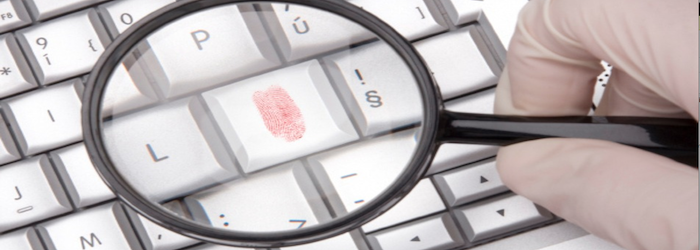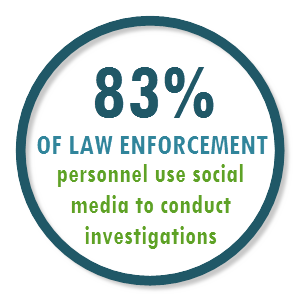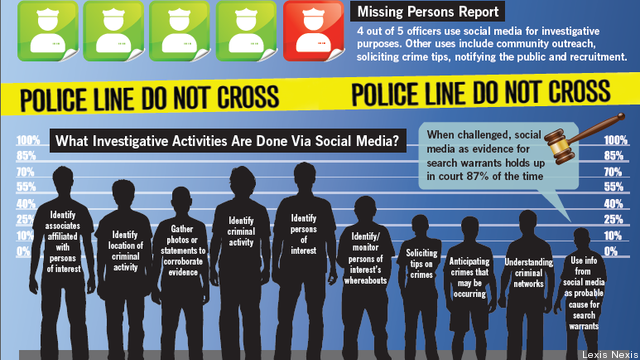The law has always fascinated me. My mom is a lawyer and ever since I was little, I was captivated whenever I overheard her discussing a case or going over a court case file. I was on the phone with her last night and she was asking about my job, trying to understand social media, because it is playing a major role in her current case. That prompted me to take a look at the current role of social media in crime investigations. Here is what I found:
The Facts
LexisNexis conducted a study in 2012 aimed at better understanding the current role of social media in law enforcement investigations. Surveying over 1,200 federal, state, and local law enforcement professionals, they found that law enforcement “embraced social media as a key tool in pre-identifying and investigating criminal activity.” Here is what they found:
- 4 out of 5 officers use social media for investigative purposes
- When challenged, social media as evidence for search warrants holds up in court 87% of the time.
- Facebook is the most used social media site for investigations, followed by YouTube and Twitter
- 2/3 of the people surveyed believe that social media helps solve crimes more quickly
Success of social media in police investigations
When a man was shot and killed in Fountain Inn, South Carolina last year, the police used his social media account to help indentify suspects, ultimately leading them to an arrest.
Source: USA Today, ‘Police fighting crime with tweets, posts’
In Cincinnati, police initiated the largest criminal gang investigation and prosecution in the history of the Department by using social media to identify key members of a local street gang. In the end, they arrested 71 gang members after a 9-month investigation, highly influenced and aided by social media. Their use of “innovation and ingenuity in law enforcement” earned them an International Association of Chiefs of Police (IACP)/West Award for Excellence in Criminal Investigations.
Source: CNN, ‘Police embrace social media as crime-fighting tool’
In New York, police and prosecutors pursued a digital trail of messages on Facebook and Twitter to indict members of an East Harlem gang tied to gun trafficking, shootings, and at least three murders. Using social media postings to build their case, police indicted 63 gang members. Mannhatan District Attorney Cryus Vance Jr. said, “These Facebook and Instagram postings are sometimes our most reliable evidence and they become our most reliable informants in identifying who’s in the gang. Gang members are Instagramming pictures of themselves with guns and cash. They are communicating about where to meet before they do something related to gang activities. They brag about what they’ve done after the fact. We see that again and again and again in these cases”
Source: Gangs using social media- and police are watching
Issue of Privacy?
In the case of Melvin Colon, issues of privacy were brought up. Colon is facing charges of murder along with weapon and narcotic-related charges. The suspected New York gang member posted public photos on Facebook that showed him flashing gang signs but made private more incriminating posts, including references to past violent crimes and threats against others.
After one of his Facebook friends agreed to give police access to Colon’s “private” information, and a federal judge ruled that Colon lost all claims to privacy when he shared those details with friends.
Many argue, as Colon’s attorney’s did, that his Facebook posts were protected under the Fouth Amendment, which shields people’s homes and effects against “unreasonable searches and seizures.” The judge disagreed, saying Colon forfeited any expectation of privacy when he shared online postings with friends. Meaning, the online world is no different than the online one when it comes to police investigations. Your friends can inform on you to the police in the offline world and detectives can go undercover to catch you, just as they can online using social media.
The flip side of the coin
Social media is clearly effective in helping police solve a crime but it can also be a hinderance. In Florida, two men are being charged with interfering in the case of a missing person after they began posting misleading information and content on social media to purposely mislead and divert investigating officers.
There also comes the issue of fake profiles. Is it right for officers to create fake Facebook profiles and Twitter accounts to investigate cases? The LexisNexis survey found that 83% of law enforcement officials said that they though it was ethical to create fake profiles for investigations. The police oftentimes pose as young girls to capture people for soliciting a minor to engage in sexual activities or they pose as a potential drug buyer in order to arrest individuals on drug crimes. That’s where the water gets murky and the lines between lawful investigation, ethics, and justice blur.
There is no doubt that there are many benefits to social media being used for police investigations. I believe any avenue should be pursued when a missing person can be found, lives can be saved, and justice can be served. And as an avid social media user, both personally and professionally, it is interesting to see how it can be used for such purposes and I’m interested to see how social media will adapt into the law enforcement culture in the future.




